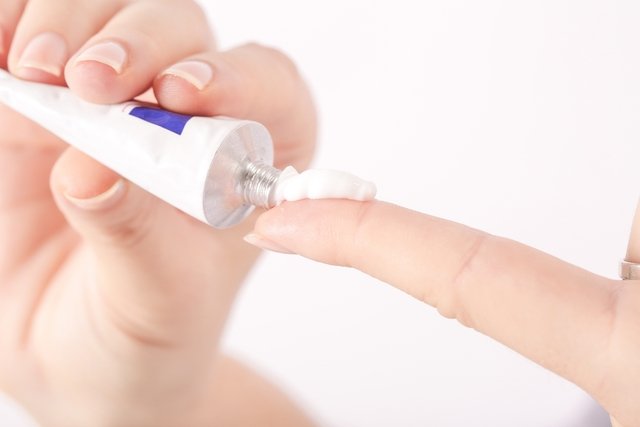Medicines for HPV, such as podophyllotoxin ointments, sinecatechins or imiquimod, for example, may be indicated to treat genital or external perianal warts caused by HPV, as they act by reducing the rate of virus replication in the lesions.
Therefore, these remedies are recommended by a gynecologist or urologist with the aim of eliminating warts caused by HPV, preventing the progression of the disease and the emergence of complications.
HPV treatment must be carried out under medical guidance and varies according to the symptoms and severity of the infection, and other treatment options may also be indicated, such as surgery to remove the warts, cauterization or cryotherapy, for example. See the main treatments for HPV.

6 remedies for HPV
Some remedies to treat HPV infection are:
1. Podophyllotoxin pomada
Podophyllotoxin or podofilox in the form of a 1.5 mg/g ointment is indicated to treat external perianal or female or male genital warts, known as condyloma acuminata, caused by the HPV virus. Understand what condyloma acuminata is.
This ointment works by preventing cell proliferation and promoting the destruction of “abnormal” cells infected by HPV, and in this way, it helps to eliminate warts.
Podophyllotoxin ointment can be found under the name Podofilina or Wartec, and should be applied only to the wart, twice a day for about 3 days.
If necessary, the doctor may recommend repeating the treatment after 7 days from the 1st day of treatment with the ointment for a maximum of 4 treatment cycles. Learn how to use podophyllotoxin ointment correctly.
2. Podophyllotoxin Solution
Podophyllotoxin solution is another treatment option for genital or perianal warts caused by HPV.
This solution is more concentrated, containing 10% to 25% podophyllotoxin and, therefore, is applied by the gynecologist or urologist to the lesions in the doctor’s office, once a week, for up to 4 weeks.
Podophyllin in the form of a solution or ointment should not be used during pregnancy.
3. Imiquimod ointment
Imiquimod ointment is indicated to treat condyloma acuminatum, which are external genital or anal warts caused by infection with the HPV virus.
This ointment can be found as the generic “imiquimod” or under the trade names Modik or Ixium, containing 50 mg/g of imiquimod, and should be used under the advice of a gynecologist or urologist.
Imiquimod ointment should be applied directly to the warts, with 1 application being recommended, before bed, on alternate days, that is, 3 times a week (Mondays, Wednesdays and Fridays, or Tuesdays, Thursdays and Saturdays). Learn how to use imiquimod ointment.
4. Sinecatechin ointment
Sinecatechin is an ointment extracted from green tea indicated to treat external genital or anal warts caused by HPV.
This ointment contains 15% sinecatechins and has immune system stimulating properties, in addition to antiproliferative and antitumor action, mainly against HPV-E6 and E7.
Sinecatechin ointment should be applied to the area with the wart, according to the guidance of the gynecologist or urologist, and may cause redness, inflammation or pain in the area applied.
5. Trichloroacetic acid solution
The 80 to 90% trichloroacetic or dichloroacetic acid solution is also another option to treat HPV infection, being applied by the doctor in the office, as it is a concentrated solution and because there is a risk of damaging the skin around the warts.
Generally, it is recommended to apply trichloroacetic or dichloroacetic acid solution once a week.
6. Isotretinoin Capsules
Isotretinoin in capsules is generally recommended for treating acne.
However, it may be indicated to treat genital or anal warts, especially in people with a weakened immune system who have many condyloma acuminata lesions or when other treatment options have not been effective in eliminating the warts.
The normally recommended dose is 0.5 mg to 1 mg per kg of body weight, per day, generally associated with topical treatment with creams or ointments, as recommended by a doctor. Find out how to take isotretinoin.
Isotretinoin should not be used during pregnancy or in cases of suspected pregnancy, as it may cause malformations in the baby.
HPV treatment in pregnancy
Treatment for HPV in pregnancy should be started as soon as the first symptoms appear, as this can promote wound healing and reduce the risk of transmitting the virus to the baby during birth.
Therefore, it is important that women follow the obstetrician’s instructions, which may indicate the use of trichloroacetic acid, electrocauterization or surgery. Learn more about HPV in pregnancy.
Natural remedy against HPV
A great natural remedy against HPV is the ointment prepared with barbatimão because it is rich in tannins that dehydrate infected cells, causing them to peel and die, promoting the elimination of the virus and the reappearance of warts.
However, this ointment was tested on only 46 people, and therefore more studies are still needed to confirm that barbatimão really is effective in eliminating the virus.
After this step, it is also necessary to obtain approval from ANVISA, which is the body responsible for regulating the sale of medicines in the national territory until this ointment can be purchased in pharmacies, under medical guidance.
Home treatment for HPV
An excellent home remedy for HPV consists of increasing the body’s natural defenses. Therefore, it is recommended:
- Quit smoking;
- Practice physical activity regularly;
- Drink plenty of water and fruit juices;
- Increase consumption of citrus fruits;
- Eat at least 2 different fruits per day;
- Avoid meat, especially red meat;
- Always eat salads and vegetables, varying them every day;
- Avoid foods full of fat and alcoholic drinks.
By adopting these measures, the body will become stronger and will be able to fight the HPV virus more quickly, but this does not exclude the need to use medications and any other medical treatment.
The sooner treatment is started, the easier it will be to cure this disease. See how to cure HPV.
Watch the following video on how to identify the first symptoms of HPV:

Sign up for our newsletter and stay up to date with exclusive news
that can transform your routine!
Warning: Undefined array key "title" in /home/storelat/public_html/wp-content/plugins/link-whisper-premium/templates/frontend/related-posts.php on line 12
Warning: Undefined array key "title_tag" in /home/storelat/public_html/wp-content/plugins/link-whisper-premium/templates/frontend/related-posts.php on line 13



